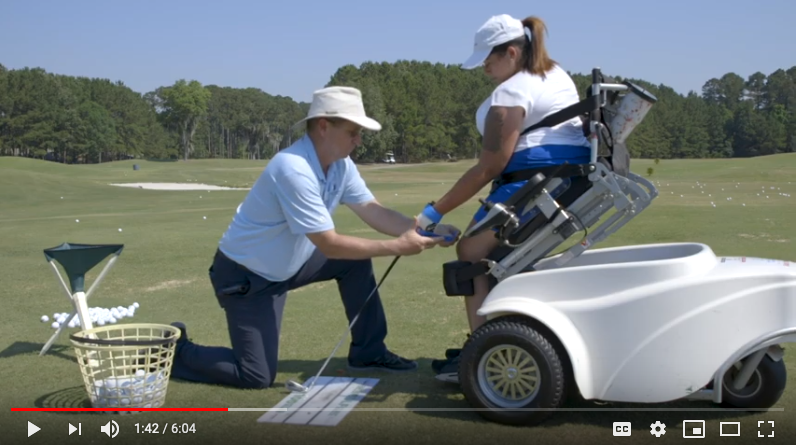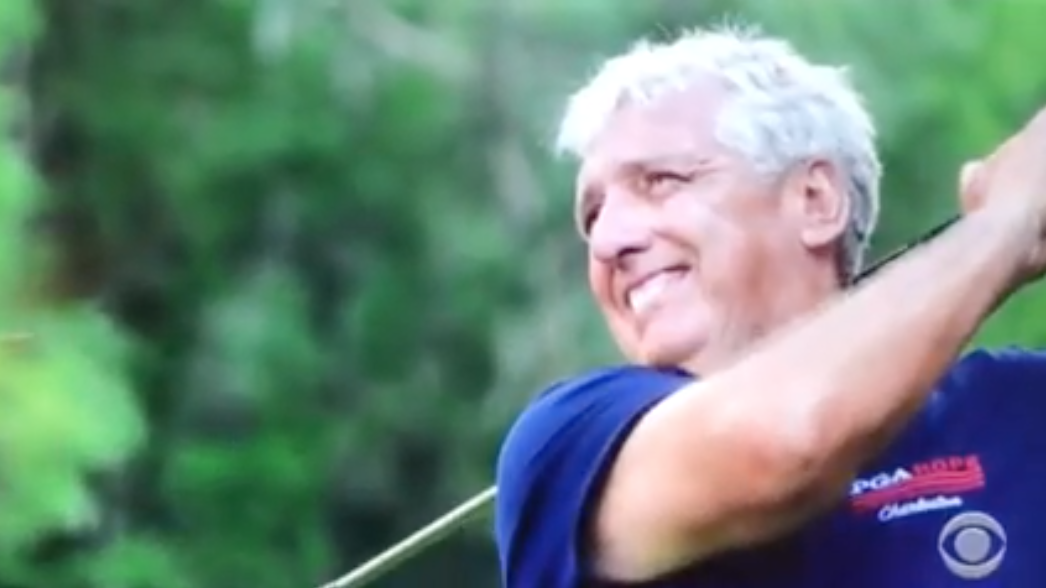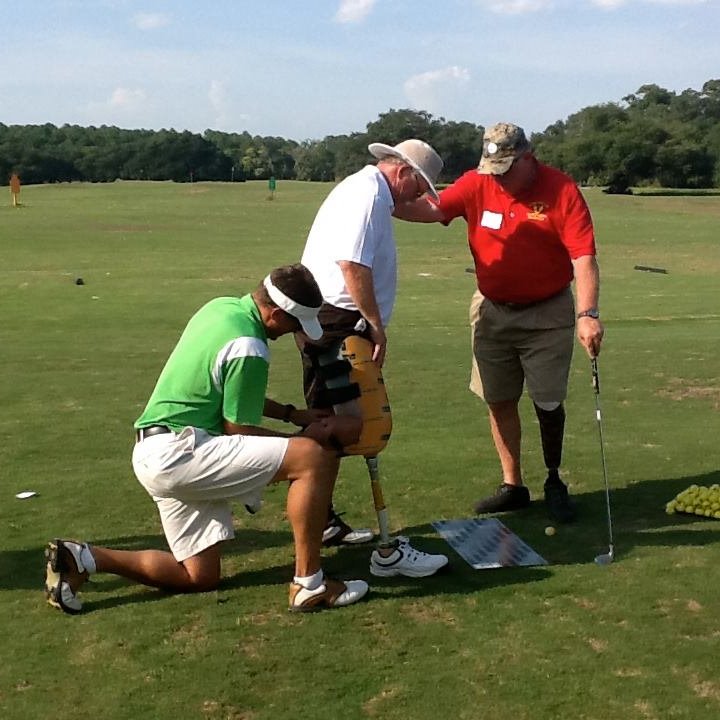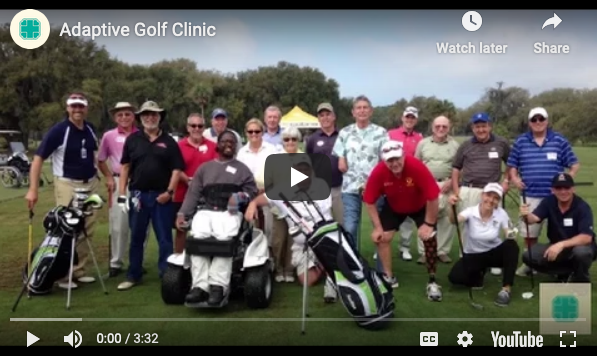Our Local Story
Savannah, Ga. (WTGS FOX 28) — The BMH Adaptive Golf Experience started back in the summer of 2014. That’s when Andy Hinson, the golf pro at the Legends Golf Course at Parris Island, and Physical Therapist Steve Giammona met to kick start the program in Beaufort.
The golf clinics target veterans and civilians throughout the Lowcountry that have physical disabilities or challenges. “We see folks who have spinal cord injuries, who have had strokes, who have had amputations,” said Giammona. Area residents, like Glenn Blackburn, a Vietnam Army veteran who suffered a stroke is now part of the program. “I had a stroke four years ago that basically paralyzed my right side. When I could not move in a wheelchair, to four years later winning a championship in my flight, I owe all of that to Adaptive Golf” said Blackburn.
But, make no mistake, the program is not just about hitting a golf ball. “We are trying to look for those who have become isolated,
who feel like they are dealing with their disability on their own and there aren’t people like them out there,” said Giammona. Byron Heyward is a stroke survivor. He has been confined to a wheelchair for 28 years. “When I can actually get in the chair and it makes me stand, they actually have to tell me to sit down sometimes. ‘I’m not ready to sit down yet,’ I say!” said Heyward.
Through physical therapy and high tech equipment, the program is allowing those who battle traumatic brain injuries, Multiple Sclerosis, and even joint replacement to participate in outdoor activities. “I got to see a new way of teaching the game. We now have four Ottobock golf carts and these are golf carts that will allow them to actually come into an upright standing position and from that position they can swing almost like an able body golfer,” said Hinson. These clinics represent what is possible with the right care, the right interventions, and the right equipment. With the support of the Beaufort Memorial Hospital, local military organizations and civic organizations have allowed participants to return to an active life style.
If you would like more information about the Adaptive Golf Experience contact Steve Giammona at 843-522-5850 or via email.
Steve’s Interview
Steve Giammona, physical therapist at Orthopaedic Outpatient Rehabilitation Clinic provides valuable information on the Adaptive Golf Clinic (third Saturday of every month)
Adaptive Golf: A New Mission for Wounded Warriors
By Rex Hoggard
May 29, 2017, 8:54 am
PARRIS ISLAND, S.C. – “They said I’d be paralyzed for the rest of my life,” smiles Edward Gizara as he pulls his driver back and launches a shot into a spring sky.
Gizara is a medical miracle. He’s an inspiration and an unfiltered example of the best of us. But most of all he’s a survivor, not that any of those descriptions fit as he smothers another tee shot low and left.
He may be a genuine hero, but a bad swing is still a bad swing, and Gizara pivots, annoyed more than angry, as his ball races toward a row of trees down the left side of The Legends at Parris Island’s practice tee. The entire episode lasts just seconds but is a shining example of what self-belief, support and some golf can do even with the bleakest of outlooks.
In the summer of 1997 Gizara was living his dream.
A career Marine who, after numerous deployments overseas, had returned to Marine Corps Recruit Depot Parris Island to become a drill instructor. For a select few it’s a rite of passage to return to where it all began to train the next generation.
As he neared the end of his training and was sent to his first platoon, Gizara was volunteered to demonstrate the proper way to climb a rope on the combat endurance course. The ensuing 26-foot fall would fracture the L3 disc in his back and change his life forever.
Gizara was medevacked to the Veteran’s Administration hospital in Augusta, Ga., where he underwent nine fusion surgeries on his back and spent eight months recovering before he could even go home. When he could finally join his family he spent six months on his back with his wife having to roll him every two hours.
For a staff sergeant who spent his entire life leading men, Gizara’s physical limitations understandably became a psychological black hole. Two decades removed from those dark moments, he can now admit that he attempted suicide a “few times.”
“Everything was no, no, no, and I just couldn’t take it anymore,” Gizara admits.
Initially, Gizara’s focus was on beating the odds and his doctor’s long-term diagnoses. He worked so hard to walk again doctors had to replace rods that had been inserted into his back multiple times because of wear and tear.
“You push yourself, so sometimes you break yourself,” he says. “I never thought I wouldn’t walk again; in the Marines you never give up and you never quit, you never stop fighting.”
Overcoming paralysis, however, was just the beginning. Gizara was still a Marine and still needed a mission, which he found on the golf course of all places.
Although he hadn’t played golf since 1997, a friend told him about an Adaptive Golf Program at The Legends that’s designed to encourage those with disabilities and challenges to play.
Cody Carter – an assistant pro at The Legends – altered Gizara’s swing to match his abilities and designed an action that wouldn’t cause any further injury. What Carter didn’t need to do was find ways to motivate Gizara. That came naturally.
“It makes you appreciate what you have, the determination people have. It’s definitely inspiring for me,” Carter says. “Golf makes them feel normal, it’s a chance to do what everyone else is doing.”
For Gizara, as it is for so many who enter programs like Adaptive Golf, being on the course was much more than simply a chance to play a game – it was freedom.
“It saved my life and my family understands that. That’s why I’m at the course so much,” Gizara says.
Gizara, who lives in Savannah, Ga., was so inspired by the program he launched a chapter in his hometown and meets with a group of about a dozen players twice a month. Just as he did when he was in the Marines, he now leads by example.
As one would expect from a former drill instructor, Gizara’s bedside manner is, well, unique. During last year’s RBC Heritage Gizara set up an Adaptive Golf booth at Harbour Town Golf Links when a man in a motorized scooter drove by.
“Can you play golf?” Gizara asked.
“Are you stupid or what?” was the man’s response.
Gizara explained what the Adaptive Golf Program offered and how they could teach the man to play with the help of new equipment like the ParaGolfer, which is an all-terrain wheelchair that raises the player into a standing position and allows a more conventional swing.
“He started playing golf and now he really keeps everyone motivated,” Gizara says of the man. “I was in the wheelchair, I was in the scooter, it gave me purpose in my life which I was missing for a long time.”
The benefits of programs like Adaptive Golf go well beyond exceeding the physical limitations of a particular injury. For those like Gizara who finds themselves lacking a purpose and passion it’s a way to reengage with life.
Steve Giammona is a physical therapist at Beaufort (S.C.) Memorial Hospital who initially began the Adaptive Golf Program at Parris Island as a way to extend his patient’s rehabilitation, but he quickly realized it was also a way for patients to re-socialize.
“Part of what all this boils down to is it creates a social network and it gives them folks they can speak to who have been through similar situations and they can speak with them about how to cope with the world,” Giammona says. “So many ways I think golf mimics life and these folks have been faced with some of the biggest adversities. As they say on Parris Island, they [Marines] overcome and adapt.”
They also say you’re always a Marine, and Gizara is certainly an example of that. Golf saved his life and gave him a purpose, which in many ways can be as debilitating as losing the use of your legs or a missing limb.
Back on the range at The Legends, Gizara spins back toward the practice tee, he twists and bends to re-tee his golf ball before settling back in with his driver.
He pauses, looks up with a glare straight out of the drill instructor’s handbook and offers one final thought, “It’s not about your inability, it’s about your ability.”





